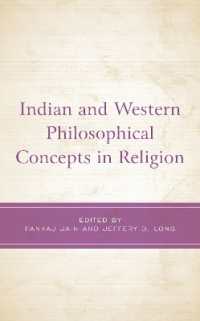- ホーム
- > 洋書
- > 英文書
- > History / World
Full Description
Conceptualizing Mass Violence draws attention to the conspicuous inability to inhibit mass violence in myriads forms and considers the plausible reasons for doing so. Focusing on a postcolonial perspective, the volume seeks to popularize and institutionalize the study of mass violence in South Asia.
The essays explore and deliberate upon the varied aspects of mass violence, namely revisionism, reconstruction, atrocities, trauma, memorialization and literature, the need for Holocaust education, and the criticality of dialogue and reconciliation. The language, content, and characteristics of mass violence/genocide explicitly reinforce its aggressive, transmuting, and multifaceted character and the consequent necessity to understand the same in a nuanced manner. The book is an attempt to do so as it takes episodes of mass violence for case study from all inhabited continents, from the twentieth century to the present. The volume studies 'consciously enforced mass violence' through an interdisciplinary approach and suggests that dialogue aimed at reconciliation is perhaps the singular agency via which a solution could be achieved from mass violence in the global context.
The volume is essential reading for postgraduate students and scholars from the interdisciplinary fields of Holocaust and Genocide Studies, History, Political Science, Sociology, World History, Human Rights, and Global Studies.
Contents
Introduction 1. Reading Mass Violence Part 1: Narratives 2. Violence and Violations: Betrayal Narratives in Atrocity Accounts 3. Holocaust survivors in Mexico: Intersecting and Conflicting Narratives of Open Doors, Welcoming Society and Personal Hardships 4. Historical Narratives, the Perpetuation of Trauma, and the Work of Vamık Volkan Part 2: Revisionism & Reconstruction 5. Holocaust, Propaganda, and the Distortion of History in the Former Soviet Space 6. The Genocide of 1971 in Bangladesh: Lessons from History 7. Holocaust Denial and Minimization in the Indian Urdu Press Part 3: Education 8. Holocaust Studies in Australia: Moving from family and community remembrance to human rights and prevention of mass violence 9. New Developments in Holocaust & Genocide Education in South Africa: : The case study of the Johannesburg Holocaust & Genocide Centre 10. A Case of Naive Normalization? India's Misbeliefs about Hitler and Schooling on the Holocaust 11. Holocaust Education in India and its Challenges Part 4: Reflections 12. Sonderkommando Photo 4 and the Portrayal of the Invisible 13. Overcoming "Intimate Hatreds:" Reflections on Violence against Yazidis 14. The State and its Margins: Changing Notions of Marginality in Turkey Part 5: Trauma 15. Pinochet's Dictatorship and Reflections on Trauma in Chile: How much have we learned in terms of human rights? Part 6: Memorialization 16. 'Grassroots' Holocaust Museums: Revealing Untold Stories 17. Fabric, Food, Song: The Quiet Continuities in Bengali Life Seventy Years After Partition Part 7: Literature 18. The Failure of Secular Publics and the Rise of the Jewish Religious Public in Nathan Englander's For the Relief of Unbearable Urges Part 8: Dialogue & Reconciliation 19.The 2002 Alexandria Summit and Its Follow Up








